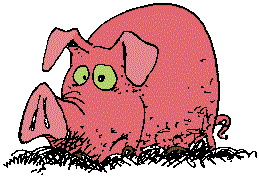 Spiritual
Insights Page
Spiritual
Insights Page Spiritual
Insights Page
Spiritual
Insights Page
Why did God make some things unclean in Leviticus 11-15?
A Unique Nation: When the Future Farmers of America hold their national convention in Kansas City, everyone who sees their corduroy-blue jackets they know a unique group is in town.
One reason why God called some things unclean was to show that the nation of Israel was unique. God forbade the nation from eating camels, pigs, eagles, buzzards, vulture, moles, mice, chameleons, and so forth (Lev. 11). When the citizens of other nations observed their unusual abstention, they would ask, "Why?" The informed would answer, "It is because Israel is a unique nation which worships the LORD."
The Residence of God: Coty Pickney is a preacher who had just returned from a long trip to Africa. It was the custom of his children to put on a performance following such absences. They would perform new skills or new games they had learned. After this trip, one young boy performed the part of a wild man complete with loin cloth over his underwear and black face crayon. The event ran late and the father announced they had to immediately leave to attend a church service. The son asked if he could go still costumed as the wild man. Although the church had a very liberal dress code, the father said no. It would have been inappropriate for non-family members to see him as the wild man.
When sin entered the Garden of Eden, God could no longer reside with mankind in the same way as He had pre-fall. There was the problem of sin (Is. 59:2). The system of sacrifices provided a temporary method by which God could reside in the temple among the citizens of Israel (e.g., Lev. 1-10, 16-17). The permanent solution was the sacrifice of the Lord of Jesus Christ. Those who trust in the Lord and His work receive God's righteousness (2 Cor. 5:21). Therefore, God will be able to reside among believers without restrictions.
But when sin entered the garden, there were also its effects. Some of these effects were amoral in themselves. However, they were imperfect or inappropriate and God also could not reside with the nation because of them. It is these effects of sin (uncleanness associated with childbirth, skin disease, mildew, sexual emissions) which are taken up in Leviticus 12-15.
The temporary way by which God could dwell with the nation was through the imposition of separation, ceremonies, and death. Old Testament characters are often observed dealing with uncleanness (Samson's mother, Judges 13:4, 7, 14; King Saul, 1 Sam. 20:26; Bathsheba, 2 Sam. 11:4; King Jehoiada, 2 Chron. 23:19; King Hezekiah, 2 Chron. 30:17-20; Ezekiel, Ez. 9:7 and Ps. 79:1 ff.; Daniel, Ex. 34:15).
Just as the sacrifice of the Lord Jesus Christ provided a permanent solution to the problem of sin, it was also the permanent solution to the problem of uncleanness. This is deduced from the new way Jesus and the apostles handled uncleanness. Jesus declared all foods clean (Mk. 7:18-19). Jesus allowed a "leper" to converse with Him (Mt. 8:2-4) and ate a meal in another "leper's" home (Mk. 14:3; see also Mt. 11:5 and Lk. 17:11-19). Jesus did not do anything which gives the impression that He thought of Himself as unclean after the woman with the issue of blood touched His garment (Mk. 5:25-34). Peter received a vision from God indicating that the laws concerning unclean food had been terminated (Ac. 10:15, see also 1 Tim. 4:4-5). Peter announced that God had shown him that no person was any longer unclean (Ac. 10:17-33). The "council at Jerusalem" did require that Gentiles not practice their freedom of eating blood and meat offered to idols in the presence of Jews immature in their faith (Ac. 15:19-21; see also Rom.14:15).
In John's vision of the things future, he announced a new creation--the unclean (impure) things had been replaced with clean things. An intimate and eternal residence of God among His saved ones is then possible. There is no longer a need for a temple with its temporary solutions for sin and uncleanness (e.g., Rev. 21:1-5, 22, 27).
 August 26, 2002, Edition -- ©
1999-2002 Ken Bowles
August 26, 2002, Edition -- ©
1999-2002 Ken Bowles